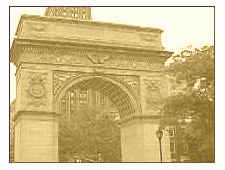 The Trade Paperback edition of "Washington Square",
published in the early 1900s, includes a short reader's guide,
in the form of study questions. This guide is occasionally included
in modern copies of the book. Below, I offer this reader's guide
for further discussion:
The Trade Paperback edition of "Washington Square",
published in the early 1900s, includes a short reader's guide,
in the form of study questions. This guide is occasionally included
in modern copies of the book. Below, I offer this reader's guide
for further discussion:
- Henry James creates an atypical heroine in the plain-faced,
dull-witted Catherine Sloper. Endeavoring to be a dutiful daughter,
Catherine bears her predicament with an almost unbelievable passivity.
Compare her strategy of obedience and patience with her aunt's advice to
her: "You must act my dear; in your situation, the great thing is to
act." Describe how Catherine both contradicts and coincides with your
perception of a literary heroine.
- Dr. Sloper controls Catherine largely with his ironic tongue
and cold sense of humor. Discuss Dr. Sloper's reason for disliking
Morris Townsend and his motive for continually objecting to Catherine's
engagement-are they one and the same, or does Dr. Sloper have another
aim in seeing if Catherine "will stick." Consider his belief that life
had "played him a trick" in giving him a plain daughter, and also the
language of gaming that he constantly uses when drolly referring to
Catherine's predicament.
- Examine James's use of setting as the plot progresses and its
effect upon his characters' behavior. Compare specifically the quaintly
upholstered sitting room at Washington Square, the seedy oyster bar, and
the dark precipice in the Alps. Why does Dr. Sloper "flare out" in the
ungoverned setting and admit that he is "not a very good man"?
- Cynthia Ozick refers to the theme of impersonation in the novel.
Explain how Catherine, Dr. Sloper, Aunt Lavinia, and Morris Townsend
figure as imposters. Who in the novel is the opposite: straightforward
and real?
- Aunt Lavinia's meddling goes from innocent prying to treachery.
Describe her attitude toward Morris Townsend and her refusal to admit
his shortcomings. Is her love for him romantic, friendly, motherly?
Consider whether she could ever have been happy in her own marriage to
the reverend.
- Determine who is the greater villain in the novel: Dr. Sloper
or Morris Townsend. Do you think Catherine is better off as a coldly
dignified spinster, or could she have found happiness as Morris
Townsend's wife? As Cynthia Ozick asks in her Introduction, "Will a
wrong motive always do harm?"
HOME -
Synopsis -
Biography -
Gallery -
Alt Ending -
Links
Setting -
Contents -
Concordance -
Download -
Guest Book
Copyright (c) 2005,
CC Charles. All rights reserved.
|

 The Trade Paperback edition of "Washington Square",
published in the early 1900s, includes a short reader's guide,
in the form of study questions. This guide is occasionally included
in modern copies of the book. Below, I offer this reader's guide
for further discussion:
The Trade Paperback edition of "Washington Square",
published in the early 1900s, includes a short reader's guide,
in the form of study questions. This guide is occasionally included
in modern copies of the book. Below, I offer this reader's guide
for further discussion:
